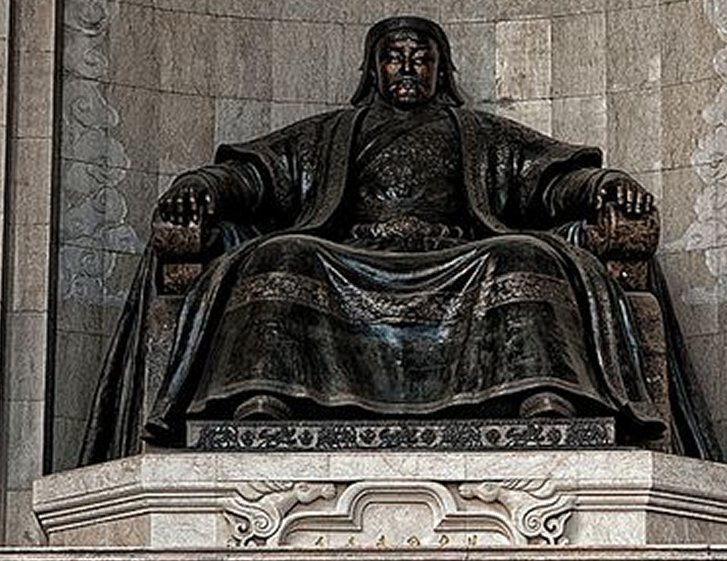Genghis Khan Has 16 Million Relatives – You Could Be One Of Them
Ellen Lloyd - AncientPages.com - Legendary Mongol leader Genghis Khan (1162-1227) is today famous for establishing the largest empire in history. He was a ruthless killer, but also a brilliant military innovator who practiced the ‘surrender or die’ policy.
Genghis Khan massacred millions of Asian and Eastern European people. However, he also practiced religious and racial tolerance, and his Mongolian Empire valued the leadership of women.
Genghis Khan married at age 16, but had many wives during his lifetime and naturally plenty of children.
He and his sons vanquished peoples from the Adriatic to the Pacific, reaching modern Austria, Finland, Croatia, Hungary, Poland, Vietnam, Burma, Japan and Indonesia. At their peak, the Mongols controlled between 11 and 12 million contiguous square miles, an area about the size of Africa.
Modern developments in DNA testing have revealed a vast number of people may, in fact, be directly related to Mongolian warrior king Genghis Khan.
A 2003 groundbreaking historical genetics study revealed that close to 8 % of men living in the former Mongol Empire carry identical Y-chromosomes. That 8% is 0.5 percent of the male worldwide population, which translates to a staggering 16 million descendants alive today.
Scientists have traced this lineage back to around 1,000 years ago, and the very special set of circumstances required for such a vast spread of DNA point to one man – a certain Genghis Khan.
“We have identified a Y-chromosomal lineage with several unusual features. It was found in 16 populations throughout a large region of Asia, stretching from the Pacific to the Caspian Sea, and was present at high frequency: ∼8% of the men in this region carry it, and it thus makes up ∼0.5% of the world total.
The pattern of variation within the lineage suggested that it originated in Mongolia ∼1,000 years ago. Such a rapid spread cannot have occurred by chance; it must have been a result of selection.
The lineage is carried by likely male-line descendants of Genghis Khan, and we, therefore, propose that it has spread by a novel form of social selection resulting from their behavior,” researchers of the American Society of Human Genetics state.
We mustn’t forget that Genghis Khan and his sons were well-known for their brutality and rapes. The number of offspring his own sons boasted was staggering. His oldest son had 40 sons and numerous daughters. One of his grandsons had 22 legitimate sons. If we add to this, his other sons and their children, we get a good idea of how it’s really possible so many people are descendants of Genghis Khan.
Although this theory is impossible to ascertain without a sample of Khan’s own DNA and we have no access to his body, it does seem likely that these identical chromosomes are linked in some way to Genghis Khan.
Genghis Khan died on August 18, 1227, during the siege of Ningxia. The cause of his death remains unknown and has been attributed to being slain in battle, illness, falling from a horse.
His final resting place remains unknown. There are suspicions the tomb of Genghis Khan is hidden in the Khentii Mountains. It is allegedly protected because people fear it’s cursed, but these are only rumors and solid evidence is missing.
Written by Ellen Lloyd – AncientPages.com
Copyright © AncientPages.com All rights reserved. This material may not be published, broadcast, rewritten or redistributed in whole or part without the express written permission of AncientPages.com
Expand for referencesMore From Ancient Pages
-
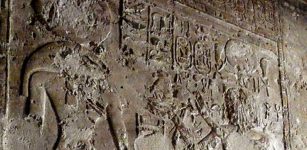 Pakhet ‘Night Huntress’: Egyptian War-Like Lioness Goddess Associated With Artemis
Egyptian Mythology | Mar 4, 2019
Pakhet ‘Night Huntress’: Egyptian War-Like Lioness Goddess Associated With Artemis
Egyptian Mythology | Mar 4, 2019 -
 Was Beautiful Ancient City Of Terracina Home To The First Hellenistic Temple?
Archaeology | Dec 16, 2019
Was Beautiful Ancient City Of Terracina Home To The First Hellenistic Temple?
Archaeology | Dec 16, 2019 -
 Goddess Huitaca – Moon Goddess Of Intoxication, Joyful Life And Unlimited Pleasures In Muisca Mythology
Featured Stories | Mar 14, 2021
Goddess Huitaca – Moon Goddess Of Intoxication, Joyful Life And Unlimited Pleasures In Muisca Mythology
Featured Stories | Mar 14, 2021 -
 Hidden Double Message Discovered On Ancient Clay Tablet Gives A Disturbing Account Of The Great Flood
Archaeology | Dec 5, 2019
Hidden Double Message Discovered On Ancient Clay Tablet Gives A Disturbing Account Of The Great Flood
Archaeology | Dec 5, 2019 -
 Sunduki – ‘Home Of The Gods’ – One Of The World’s Oldest Astronomical Observatories
Civilizations | Oct 4, 2015
Sunduki – ‘Home Of The Gods’ – One Of The World’s Oldest Astronomical Observatories
Civilizations | Oct 4, 2015 -
 Babylonians And Sumerians Had Advanced Knowledge Of Astronomy
Civilizations | Feb 28, 2017
Babylonians And Sumerians Had Advanced Knowledge Of Astronomy
Civilizations | Feb 28, 2017 -
 Aurignacians: Sophisticated And Mysterious Culture That Arrived To Levant 40,000 Years Ago – New Study
Archaeology | Nov 10, 2019
Aurignacians: Sophisticated And Mysterious Culture That Arrived To Levant 40,000 Years Ago – New Study
Archaeology | Nov 10, 2019 -
 Palatine Light Legend Is Based On A True And Tragic Event – What Really Happened On Block Island
Featured Stories | Dec 4, 2020
Palatine Light Legend Is Based On A True And Tragic Event – What Really Happened On Block Island
Featured Stories | Dec 4, 2020 -
 Stunning Reconstruction Of Caterthun Iron Age Forts In The Grampian Mountains, Scotland
Civilizations | Nov 17, 2016
Stunning Reconstruction Of Caterthun Iron Age Forts In The Grampian Mountains, Scotland
Civilizations | Nov 17, 2016 -
 Our Lives Have Always Been Manipulated By Money – Part 2
Featured Stories | Jun 4, 2022
Our Lives Have Always Been Manipulated By Money – Part 2
Featured Stories | Jun 4, 2022 -
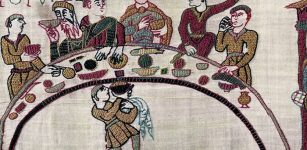 Bayeux Tapestry: Original Location Of Remarkable Romanesque Art – Finally Solved
Archaeology | Oct 26, 2019
Bayeux Tapestry: Original Location Of Remarkable Romanesque Art – Finally Solved
Archaeology | Oct 26, 2019 -
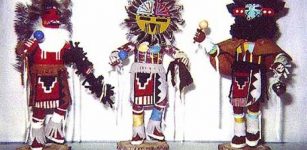 Astonishing Secrets Of Legendary Kachinas: Watchers Of The Hopi
Civilizations | Apr 8, 2017
Astonishing Secrets Of Legendary Kachinas: Watchers Of The Hopi
Civilizations | Apr 8, 2017 -
 Old Bone Links Lost American Parrot To Ancient Indigenous Bird Trade
Archaeology | Nov 8, 2022
Old Bone Links Lost American Parrot To Ancient Indigenous Bird Trade
Archaeology | Nov 8, 2022 -
 Tomography And Radiocarbon Dating Used To Examine Australian Aboriginal Knife
Archaeology | Jul 3, 2023
Tomography And Radiocarbon Dating Used To Examine Australian Aboriginal Knife
Archaeology | Jul 3, 2023 -
 Dozens Of Unique 2,500-Year-Old Ceremonial Treasures Discovered In A Drained Peat Bog
Archaeology | Jan 27, 2023
Dozens Of Unique 2,500-Year-Old Ceremonial Treasures Discovered In A Drained Peat Bog
Archaeology | Jan 27, 2023 -
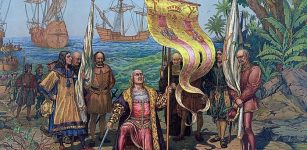 No Evidence Ancient Caribbeans Were Cannibals – Scientists Say
Archaeology | Aug 23, 2021
No Evidence Ancient Caribbeans Were Cannibals – Scientists Say
Archaeology | Aug 23, 2021 -
 Did Ancient Romans Use Four-Meter Deep Shafts As Refrigerators During Summer?
Archaeology | Apr 6, 2018
Did Ancient Romans Use Four-Meter Deep Shafts As Refrigerators During Summer?
Archaeology | Apr 6, 2018 -
 Secrets Of Nanomaterial From The Middle Ages Examined By Scientists
Archaeology | Oct 11, 2022
Secrets Of Nanomaterial From The Middle Ages Examined By Scientists
Archaeology | Oct 11, 2022 -
 Zapotecs’ Magnificent City Of Mitla Was Destroyed By A Seismic Landslide
Archaeology | Aug 23, 2024
Zapotecs’ Magnificent City Of Mitla Was Destroyed By A Seismic Landslide
Archaeology | Aug 23, 2024 -
 Ostrich Egg Vessel And Thracian Horseman Fibula Found In Roman-Era Burial Mound In Bulgaria
Archaeology | May 5, 2020
Ostrich Egg Vessel And Thracian Horseman Fibula Found In Roman-Era Burial Mound In Bulgaria
Archaeology | May 5, 2020


